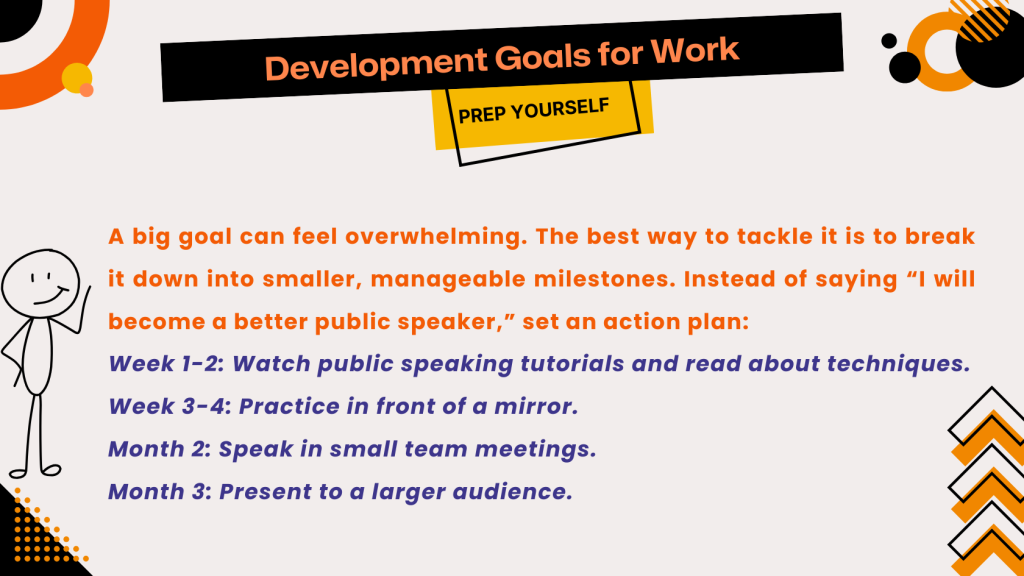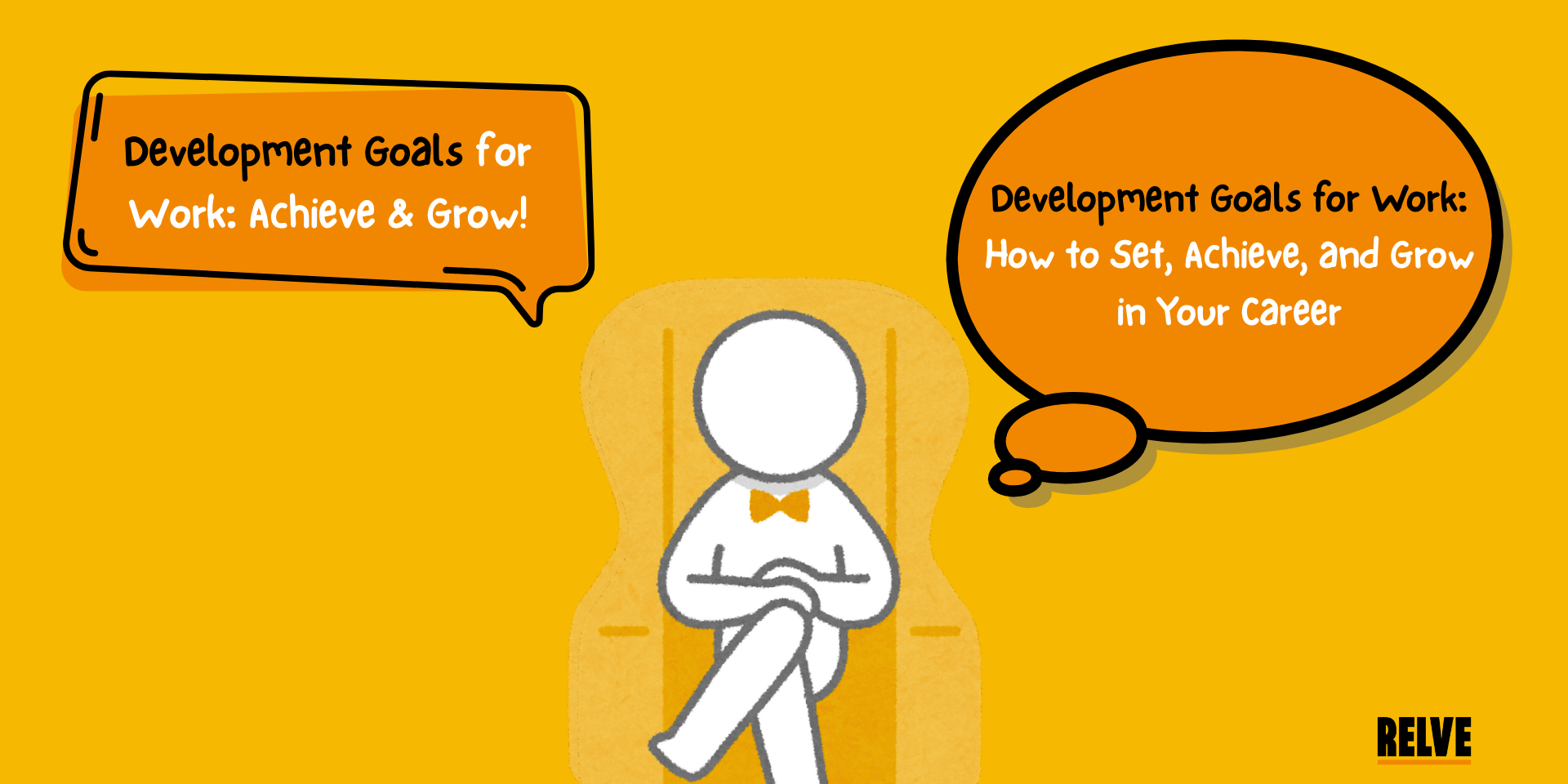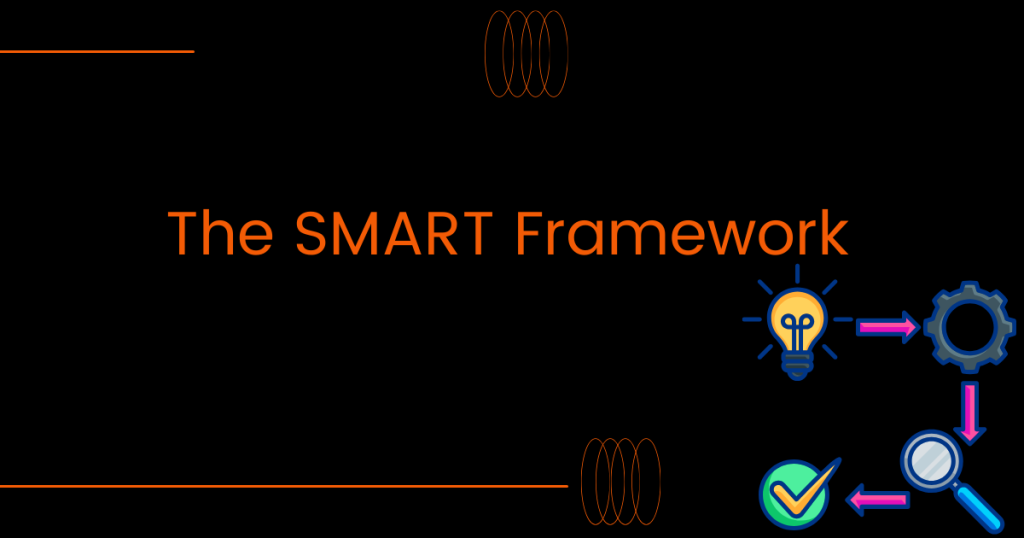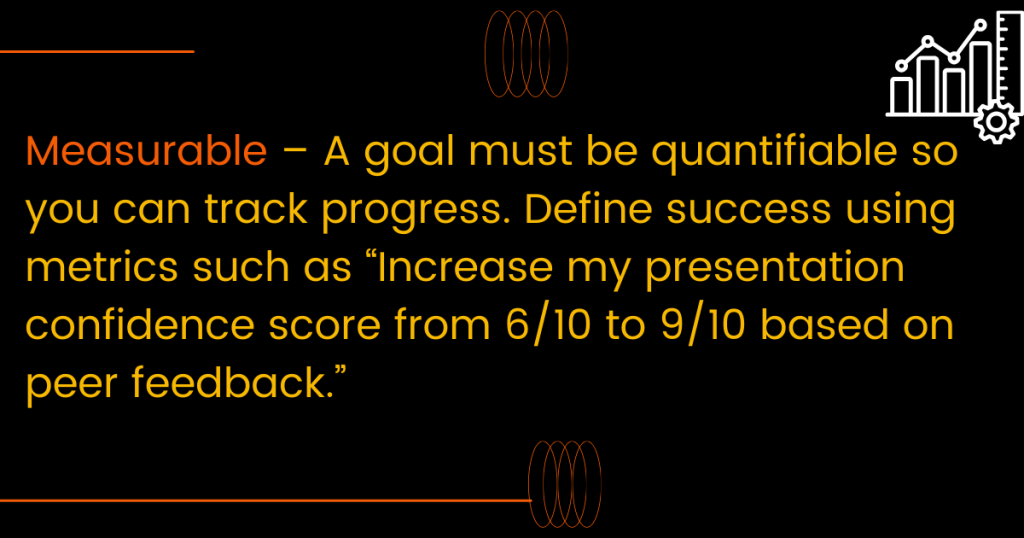Why Setting Development Goals for Work Matters
You’re working hard, putting in long hours, completing tasks efficiently, and hoping that one day—just one day—you’ll wake up to a promotion, a raise, or an exciting new opportunity. Sounds familiar? If so, you’re not alone.
Many professionals believe that simply working hard is enough to advance in their careers. However, career growth doesn’t happen by accident; it happens through intentional development goals for work that challenge you to improve, refine your skills, and expand your capabilities.
Without structured goals, it’s easy to feel stuck, watching others move ahead while you remain in the same position. This can lead to frustration, burnout, or even questioning your career choices. The truth is that growth and development goals for work are your roadmap to success. They provide clarity, motivation, and purpose, ensuring that each step is strategically aligned with your long-term vision.
At some point, you realize that your personal success is dependent on your ability to inspire, motivate, and guide others to their own great performances.
Kirkman & Harris, 3D Team Leadership
In other words, development goals for work aren’t just about you—they’re about how you contribute to your team, company, and industry. When you grow, you create opportunities for collaboration, mentorship, and leadership, helping to shape a more dynamic and successful workplace.
So, how can you develop goals for work that lead to career advancement? How do you ensure they are achievable, measurable, and inspiring? In this guide, we’ll break down how to set, achieve, and sustain development goals that will propel you forward without leading to burnout. Because when you take charge of your growth, you don’t just survive at work—you thrive.
1. What Are Development Goals for Work?
Understanding Development Goals in the Workplace
At its core, a development goal for work is a strategic objective designed to help individuals enhance their skills, expand their knowledge, and improve their overall professional performance.
Unlike daily tasks or performance metrics, these goals focus on long-term career growth, allowing employees to reach their full potential while contributing positively to their teams and organizations.
These goals may take different forms, from improving leadership capabilities to acquiring new technical skills or developing stronger interpersonal abilities. The key is to ensure they are aligned with both personal aspirations and organizational needs.
A well-structured development plan not only helps employees grow but also benefits the company by fostering a more skilled, engaged, and productive workforce.
Why Are Development Goals for Work Important?
- They Provide Direction: Instead of aimlessly working through tasks, you create a clear roadmap for your career growth.
- They Increase Accountability: When you set measurable objectives, you hold yourself responsible for achieving tangible results.
- They Enhance Motivation: Progressing toward a well-defined goal fosters a sense of accomplishment and purpose.
- They Strengthen Your Value in the Workplace: Investing in your development makes you more competitive, promotable, and indispensable.
Do you have a development goal for this quarter?
2. How to Set SMART Development Goals for Work
Setting SMART development goals for work is one of the most effective ways to ensure meaningful career progression. Without clear and structured goals, employees often feel lost, unsure of what steps to take next. The SMART framework helps transform vague aspirations into concrete, actionable plans that drive success.
Breaking Down the SMART Framework
By following the SMART method, professionals can set good development goals for work that encourage growth, create career opportunities, and increase job satisfaction.
Now that we’ve set strong goals, let’s explore examples of development goals for work to inspire your journey!
3. Examples of Development Goals for Work
Identifying the right development goals for work can be a daunting task, especially when trying to balance personal growth with professional demands. To make the most impact, goals should align with your unique strengths, long-term career aspirations, and the evolving needs of your organization.
Whether your focus is on refining technical expertise, strengthening leadership capabilities, or boosting personal efficiency, choosing well-defined goals will ensure you stay on the path to professional success.
Skill-Based Development Goals
Developing new skills is critical for staying competitive in today’s fast-changing job market. Here are some examples of development goals for work related to skill-building:
- Mastering a new tool or software – Learning Excel macros, Google Analytics, SQL, or Python can enhance data-driven decision-making.
- Enhancing writing and communication skills – Whether you’re crafting reports or emails, effective communication makes a difference in leadership and collaboration.
- Improving negotiation and persuasion skills – Strengthening these skills helps in securing deals, managing conflicts, and fostering strong professional relationships.
Leadership Development Goals for Work Examples
If leadership is part of your career vision, setting leadership development goals will prepare you for more responsibility. Here are some ideas for development goals at work that focus on leadership:
- Taking charge of a cross-functional project – Leading a team on a complex initiative enhances decision-making, delegation, and strategic thinking.
- Becoming a mentor or coach – Helping a junior employee grow builds your leadership presence and fosters team development.
- Developing conflict resolution skills – Leaders must navigate workplace tensions smoothly and constructively.
Self-Development Goals for Work
Personal growth is just as important as professional skills. Consider these self-development goals work examples:
- Boosting emotional intelligence – Understanding and managing emotions can improve teamwork and leadership effectiveness.
- Strengthening time management – Productivity techniques like time-blocking and prioritization help avoid burnout.
- Enhancing public speaking confidence – Delivering impactful presentations increases influence and career opportunities.
Choosing individual development goals for work that challenge you will boost your career trajectory while benefiting your workplace. Now, let’s explore how to achieve these goals effectively!
4. How to Achieve Your Development Goals for Work
Setting development goals for work is only the first step—achieving them requires discipline, strategy, and persistence. Many people set ambitious goals but fail to follow through because they don’t have a structured approach. Here’s how you can turn good development goals for work into real success:
Break Goals Into Small Steps

Stay Accountable
Accountability increases your chances of success. Share your individual development goals for work with your manager, mentor, or peers. Regular check-ins ensure you stay on track. If your company offers employee development goals for work examples, use them as benchmarks to measure progress.
Track Your Progress
Use tools like journals, spreadsheets, or project management apps to track your progress. Visualizing growth keeps you motivated and helps you adjust strategies.
Overcome Setbacks with the Right Mindset
Challenges are inevitable. Instead of seeing setbacks as failures, use them as learning opportunities. Embrace feedback, adjust your approach, and keep pushing forward.
By breaking goals into actionable steps, staying accountable, tracking progress, and maintaining resilience, you can transform your career through development goals. Now, let’s explore how to measure success and adjust goals as needed!
5. Measuring Success and Adjusting Your Goals
Progress in career development isn’t just about setting goals; it’s about tracking progress, evaluating effectiveness, and making necessary adjustments. Goals that are not monitored can become stagnant, and without measurement, it’s difficult to know whether your efforts are paying off.
How to Evaluate Your Progress
- Quarterly Self-Reviews – Regular self-assessments allow you to check in on how well you’re progressing. Ask yourself: Am I developing the skills I aimed for? Have I encountered roadblocks? What adjustments need to be made?
- Feedback from Managers and Peers – Constructive feedback is an essential part of professional growth. Getting an external perspective on your strengths and areas of improvement can provide new insights and help refine your approach.
- Using Measurable Data – If your goal is skill development, track metrics such as certifications completed, projects handled, or performance improvements. Tangible progress indicators help maintain motivation.
- Reflection on Daily Tasks – Take a step back and analyse how your daily tasks have evolved. Are you more efficient? Have you increased your confidence in certain areas? Personal reflections help reinforce learning.
Be proactive in measuring and refining your development goals to ensure continuous growth and meaningful progress.
6. The Role of Organizations in Employee Development Goals for Work
A workplace isn’t just a space where employees clock in and out—it should be a hub for continuous learning, professional development, and career growth. While individual employees take responsibility for their career progression, organizations play a crucial role in facilitating and supporting those ambitions.
How Organizations Can Support Employee Development Goals
- Providing Learning and Development Resources – Companies that invest in training programs, tuition reimbursement, and on-the-job learning opportunities create an environment where employees can upskill without seeking external resources. Offering structured development plans ensures that employees have clear pathways to success.
- Encouraging Mentorship and Coaching – Employees thrive when they receive guidance from experienced professionals. Companies that promote mentorship programs help employees navigate challenges, set meaningful goals, and develop leadership skills.
- Creating a Culture of Continuous Growth – Development isn’t a one-time event; it’s an ongoing process. Companies should regularly assess employee goals, offer stretch assignments, and encourage cross-functional learning to ensure long-term engagement.
- Providing Constructive Feedback and Career Pathing – Employees need transparent career roadmaps to understand how their skills and contributions align with company objectives. Performance reviews should not just highlight past performance but also outline growth opportunities.
The Danger of a Workplace That Stifles Development
A company that fails to prioritize employee development goals for work risks high turnover, disengaged employees, and stagnant innovation.
Employees should advocate for themselves, but if growth opportunities are consistently ignored, it may be time to explore new professional avenues.
A thriving workplace prioritizes both business success and individual career development. Let’s explore common mistakes to avoid when setting development goals next!
7. Common Mistakes to Avoid When Setting Development Goals
Not all development goals for work lead to success—some end up causing frustration, burnout, or stagnation simply because they weren’t set up properly. Here are some common mistakes to watch out for when setting your goals:
Setting Vague or Overly Broad Goals
A goal like “I want to improve at work” sounds great in theory but lacks clarity. Instead, focus on specific outcomes such as “I will improve my project management skills by completing an Agile certification within three months.” Vague goals make it difficult to track progress and reduce accountability.
Ignoring Feedback and Adaptability
Many professionals set goals in isolation without seeking insight from managers, mentors, or peers. Feedback is essential for identifying blind spots and ensuring that goals align with both personal aspirations and business needs. Moreover, being too rigid with goals can lead to stagnation rather than progress.
Failing to Set Measurable Milestones
Tracking progress is key to achieving success. Without clear benchmarks, it’s easy to lose motivation or feel like you’re not making any progress. Breaking large goals into smaller, measurable steps ensures consistent improvement and provides a sense of accomplishment.
Overloading Yourself with Too Many Goals
Ambition is great, but trying to do too much at once can lead to burnout. Instead of setting 10 goals and barely making progress on any, focus on 2-3 meaningful development goals at a time to achieve tangible results.
Not Celebrating Small Wins
Development is a journey, and every step forward counts. Recognizing small achievements boosts morale and keeps motivation high. Growth takes time, and acknowledging progress along the way builds long-term success.
Avoid these pitfalls, and you’ll be well on your way to setting powerful, achievable development goals that drive real career growth!
8. The Psychological Impact of Career Growth
Career growth is often celebrated as a sign of success, but what happens behind the scenes—mentally and emotionally—is just as important. While achieving development goals for work can lead to higher confidence and job satisfaction, the journey is not always easy. Growth brings challenges, self-doubt, and increased pressure, making it essential to understand the psychological impact of professional development.
Confidence and Self-Worth
There’s no better feeling than setting a goal, working toward it, and finally achieving it. Accomplishing professional development goals for work strengthens self-confidence, proving that you are capable of learning, adapting, and excelling. Each milestone serves as a reminder of your value and contributions, whether it’s leading a team, earning a new certification, or handling complex projects.
However, confidence doesn’t develop overnight. Imposter syndrome—the feeling that you don’t deserve your success—is common among high achievers. The best way to combat this is to celebrate small wins and acknowledge progress, no matter how minor it may seem.
The Stress of Growth
Let’s be real, career growth can be overwhelming. The pressure to perform, meet deadlines, and constantly upskill can lead to stress, burnout, and anxiety. While ambition is important, pushing yourself too hard without balance can backfire. The key is to pace yourself, set realistic development goals for work, and prioritize mental well-being alongside professional success.
The Power of Resilience
Not every goal will be achieved on the first try. Failures, setbacks, and rejections are inevitable—but they also build resilience.
Growth is a process of learning, adjusting, and moving forward, even when things don’t go as planned.
Embracing the psychological highs and lows of career growth is essential for long-term success. A resilient mindset, combined with strategic development goals, is what truly leads to transformation.
Keep Growing, Keep Thriving
Career growth isn’t a one-time event—it’s a continuous journey of learning, evolving, and challenging yourself. Development goals for work serve as your roadmap to success, helping you navigate through new opportunities, overcome obstacles, and refine your skills.
Whether you’re working toward technical mastery, leadership excellence, or self-improvement, setting intentional and strategic goals ensures that your progress is meaningful.
But let’s be real—growth isn’t always easy. There will be moments of self-doubt, setbacks, and frustration, but the key is to stay committed.
The difference between those who excel in their careers and those who stagnate is consistency, adaptability, and resilience.
The most important thing? Never stop setting new goals. Once you’ve achieved one milestone, challenge yourself with another. Keep learning, keep developing, and keep pushing forward. The world of work is constantly evolving, and the professionals who thrive are the ones who embrace change and remain proactive about their growth.
Final Takeaways
- Development goals provide direction, motivation, and measurable success.
- SMART goals make it easier to set clear, achievable objectives.
- Growth is a continuous process—celebrate small wins and keep going.
- Resilience and adaptability are essential in achieving career success.
So, what’s next for you? What’s your biggest development goal for work right now? Set it, plan it, and start working toward it today—because your career growth is in your hands.






